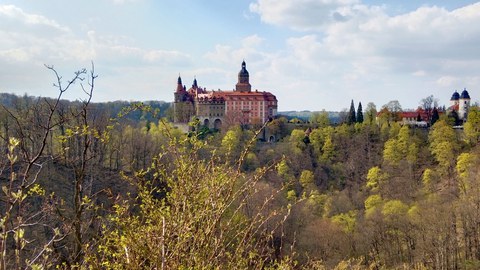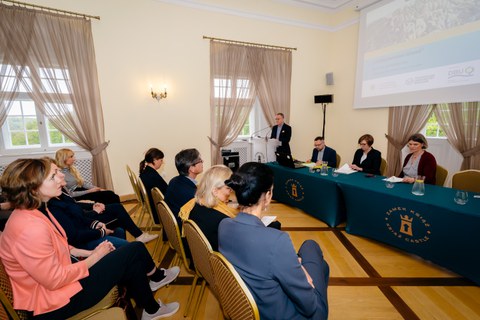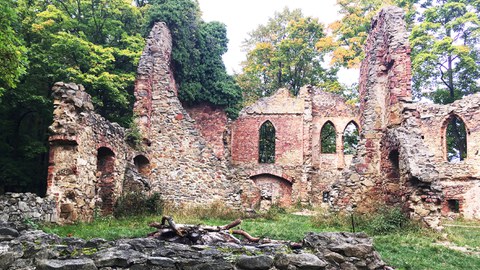Apr 18, 2024
German-Polish pilot project protects cultural and natural heritage in the “Fürstensteiner Grund”

View of Książ Castle (in German: Schloss Fürstenstein) from the viewing platform. “Fürstensteiner Grund” is located below the castle in a deeply indented valley.

Speakers' row from left to right at the green table: Prof Dr Marcus Köhler, Dr Robert Sobolewski, Dr Justyna Jaworek-Jakubska, Marlen Hößelbarth First row auditorium: from left to right: Constanze Fuhrmann (Deutsche Bundesstiftung Umwelt, DBU), Mateusz My
In an exemplary act of cross-border collaboration, TU Dresden and the University of Environmental and Life Sciences in Wrocław (UPWr) have carried out a pilot project to preserve the natural and cultural heritage of the “Fürstensteiner Grund” (a deep valley in Lower Silesia, Poland). On April 17, the successful completion of the project will be celebrated – together with all partners – in the impressive setting of Książ Castle, the third-largest castle in Poland.

A centerpiece of the “Fürstensteiner Grund”, which was embellished at the end of the 18th century, is the Old Fortress, now a ruin.
The pilot project “On integrated cultural landscape development, using the example of the Fürstensteiner Grund” is characterized by a combination of cultural history, historical garden conservation, nature and water protection, and also tourism. Since May 2021, experts from both universities have been working on the development of an overall strategy for the preservation and maintenance of the historical park, which was created in the 18th century and is now considered a cultural and natural heritage site of exceptional value. They have been funded by the Deutsche Bundesstiftung Umwelt (DBU: German Federal Foundation for the Environment)
This project serves as a model for international collaboration in the field of environmental and cultural heritage protection in the border triangle area where Saxony, Poland and Czechia meet. Solutions that are scientifically sound and practically feasible became possible by pooling expertise from various disciplines and by working closely with local stakeholders, such as the state forest and monument protection authorities.
"The results show how sustainable concepts for the protection and development of cultural and natural heritage sites can be implemented through cross-border collaboration and interdisciplinary research. This underlines the role of TU Dresden as an innovative force in international collaboration, and through joint efforts to preserve our European heritage. It strengthens the relationship with the neighboring countries of Poland and Czechia ", explains Prof. Ronald Tetzlaff, Chief Officer Technology Transfer and Internationalization at TU Dresden. "The successful execution of the project provides a solid foundation for future initiatives and shows how important continuous care and development are to preserve these unique cultural and natural heritage sites for the generations to come.".
Książ Castle is open to visitors all year round. The “Fürstensteiner Grund” is about a 20-minute walk from the castle. Further information about the project is available on the bilingual project website: http://pelcznica.upwr.edu.pl/de/.
Contact:
Marlen Hößelbarth
Chair of History of Landscape Architecture and Preservation of Garden Monuments
Institute of Landscape Architecture
Tel.: +49 351 463-35726
About the University of Environmental and Life Sciences in Wrocław (UPWr)
Wrocław University of Environmental and Life Sciences (UPWr) is one of the best specialist universities in Poland. It conducts training and research in the fields of agricultural and natural sciences as well as in engineering and technical sciences.
Wrocław, located in southwestern Poland, is one of the fastest growing cities in the country. It is a place with diverse industries, a wide range of services and an accessible cultural life. Wrocław is also an academic city, where 30 universities and colleges educate approximately 110,000 students every year.
